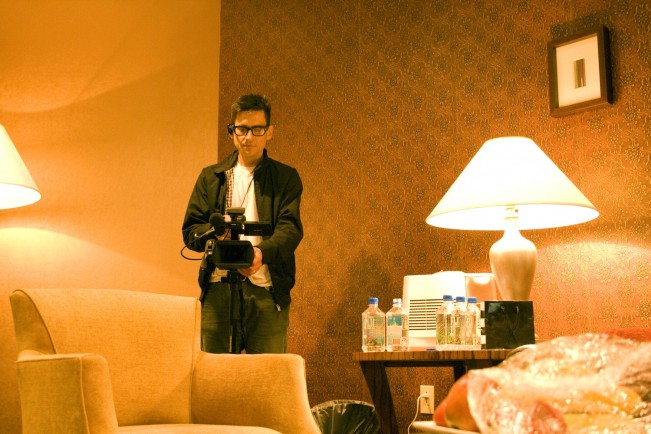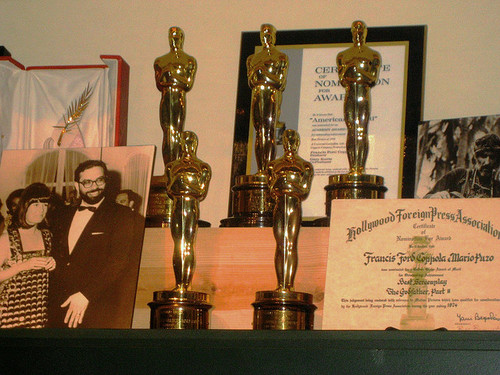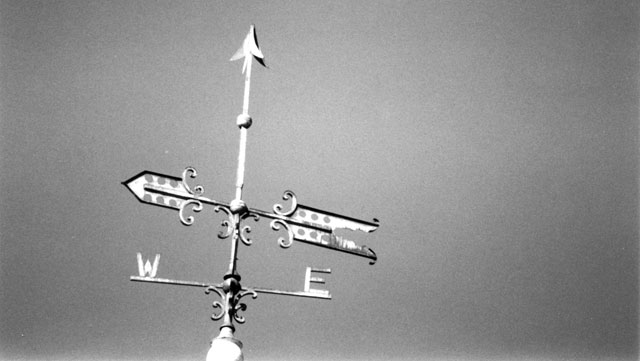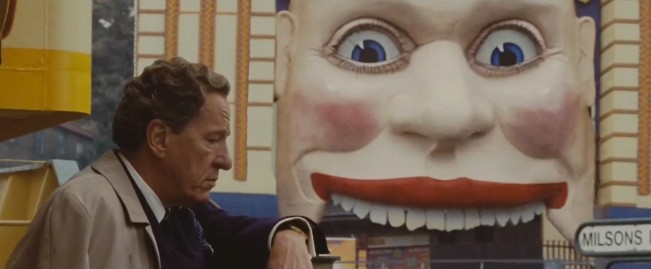Movie City Indie Archive for June, 2011
Picturing Rodman Flender
My favorite photograph in a long summer weekend of image research and writing: photographer-editor-director Rodman Flender as spy-on-the-wall for his doc, Conan O’Brien Can’t Stop. Casual geekdom and casual privilege align in a hotel room: photographer photographed. Team Fiji Water! (Do not ask what is wrapped in plastic.)
[Photo Credit: Aaron Bleyaert.]
Review: GENERAL ORDERS No. 9
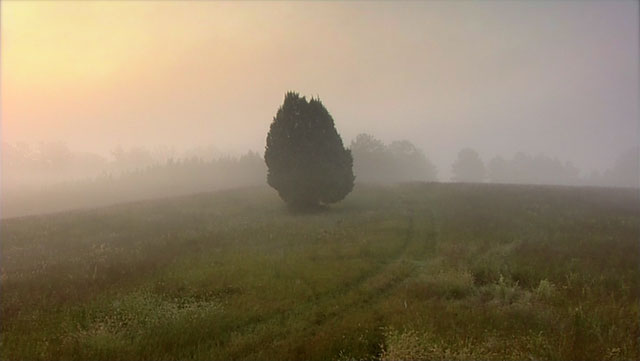
Robert Persons’ General Orders No. 9 is an essay film at least partly about the urbanization of rural Georgia, reminiscent of Patrick Keiller’s lovingly dyspeptic but visually striking London and Robinson in Space or Terence Davies’ brooding memory musical Distant Voices, Still Lives. It’s more in that school than Terrence Malick’s Tree of Life, the convenient reference point in some reviews of its New York week-long run. (The free-floating character of the narration doesn’t distill itself to the many voices of so-similar inchoate spiritual yearning in the Malick film.) Haunted beauty, a majestic trance: it’s deeply invested in what Greil Marcus called “old, weird America.” Daniel James Scott interviews Persons at Filmmaker. Of overt influences, he tells Scott, “Gosh, I’m sort of all over the place. But there were certainly a lot of films that we used to reference—a lot of Tarkovsky films, Herzog films, Chris Marker, John Grierson docs, the British Film Unit, David Lynch and Harry [Everett] Smith. There were also a number of novels and books. One in particular was this bit of naturalist writing from the 18th century, William Bartram’s Travels. He was a Philadelphia naturalist who travelled through the southeast and was really the first to write about it while drawing pictures of plants and animals. His writing is very effusive, and has a lot of sense of wonder in it. I liked the idea of someone going around recording things. And I saw my film as an updating of that in a sense.”
R.I.P. Peter Falk
Mikey and Nicky.
“The last time I trusted a dame…”
A Woman Under The Influence.
“Serpentine! Serpentine!”
“For Chrissakes, get me a good hat here.” Wings of Desire.
From Jean Genet’s The Balcony.
NO REFUNDS ON AUTEUR CINEMA
 From Stamford, Connecticut’s Avon Theatre.
From Stamford, Connecticut’s Avon Theatre.
[Via Jim Emerson @jeemerson and @nextprojection. The apparent original poster is here.]
The Further Adventures Of Hannah Hart
Playing dangerous drunken stunts in the confines of her kitchen, comedienne Hannah Hart just got noticed by TIME:
“Do you really get drunk in all of your videos, or are you faking it?
“I really do get that drunk. It takes about an hour to shoot each video, so I’m actually the drunkest after it’s over. For the ice cream one, I was with my sister and her husband, and I really just let myself go. I finished the video and I remember walking over the couch and lying down. I woke up hours later with a plate of chicken nuggets on my chest and my sister leaning over me going, ‘Eat these.’ The sun had already set and everything.”
Previewing Robert Kramer’s Long-Unseen MILESTONES (5’30”)
“Icarus Films, a leading distributor of documentary films since 1978, is proud to have acquired two landmark films by the radical leftist filmmaker Robert Kramer. A founder of the storied 1960s Newsreel collective, Kramer (1939-1999) traveled through Latin America and Vietnam, and later lived for many years in France, where he enjoyed his greatest appreciation as a filmmaker. The subject of 2009 retrospectives at Anthology Film Archives and Harvard Film Archive, Kramer’s concerns about the intersection between the personal and political take viewers to the 1960s and 70s with vivid intimacy.”
MILESTONES (1975, color, 195 minutes, by Robert Kramer and John Douglas) is a lilting, free-associative masterpiece that follows dozens of characters–including hippies, farmers, immigrants, Native Americans, and political activists–as they try to reconcile their ideals with the realities of American life. In intimate discussions of subjects from communal living to parenting, pregnancy to family, Vietnam to Cuba, city life to country life, and the workplace to the bedroom, the film’s diverse protagonists negotiate jealousies, relationships, and the logistical challenges of their rapidly changing world. Shot in vivid color 16mm, using innovative layered sound design and editing techniques as well as slides and archival footage, Milestones tracks its subjects through scripted and unscripted moments. It follows them as they share their emotions and dreams, their idealism and disillusionments, their triumphs and defeats of the past, as well as the possibilities for the future.”
Trailering QUICK (퀵)
http://www.youtube.com/watch?v=X36QkuVHCuc&feature=player_embedded
The Fast and the Over-reacting.
Scottish Summer Weather: Chance Of Heil
http://www.youtube.com/watch?v=0LIVt9RFvE4&feature=player_embedded
1 Comment »Trailering Fred Schepisi’s THE EYE OF THE STORM
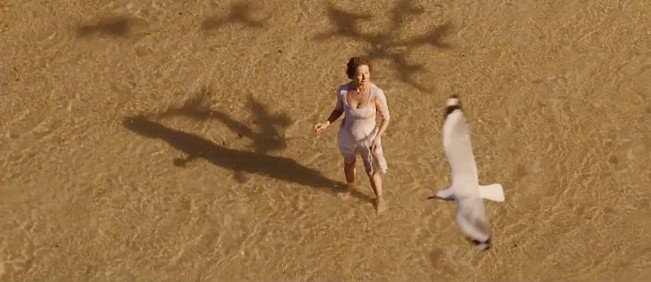 It is about time. One of the undersung modern masters of widescreen composition and cutting has almost finished a new film. Let’s hope it’s a corker.
It is about time. One of the undersung modern masters of widescreen composition and cutting has almost finished a new film. Let’s hope it’s a corker.
The non-embeddable trailer is here.
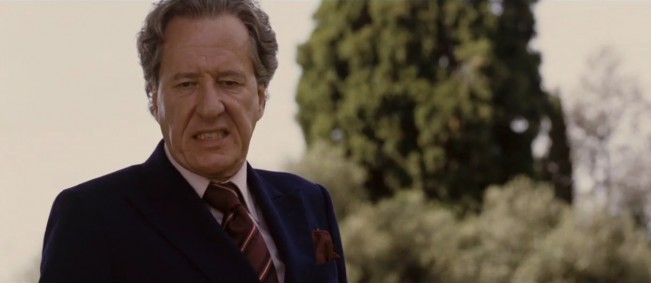 Plus: Schepisi on the characters from Patrick White’s epic Aussie novel, played by Geoffrey Rush, Charlotte Rampling, Judy Davis, Colin Friels and Dustin Clare. The release down under is set for September 8.
Plus: Schepisi on the characters from Patrick White’s epic Aussie novel, played by Geoffrey Rush, Charlotte Rampling, Judy Davis, Colin Friels and Dustin Clare. The release down under is set for September 8.





